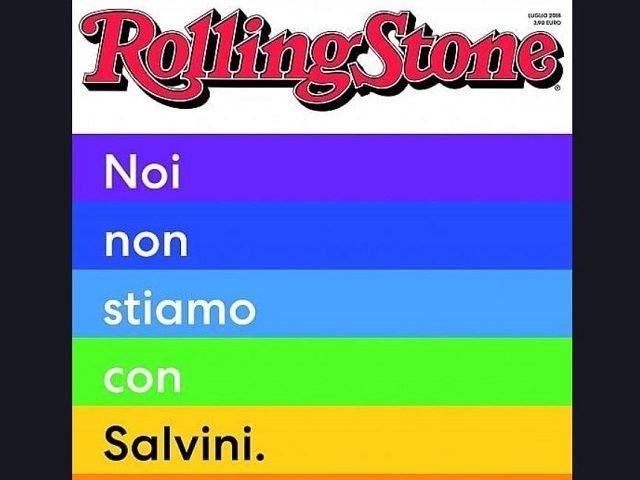The Italian language version of Rolling Stone magazine has dedicated its July issue to inciting resistance against Italy’s Interior Minister Matteo Salvini, in a manner reminiscent of similar public attacks on President Donald J. Trump in the United States.
On a rainbow-colored background, the Rolling Stone issue bears the title “We are not with Salvini” in direct confrontation with the League leader’s campaign slogan in the lead-up to last March’s elections: “We are with Salvini.”
The well-known magazine of music and pop culture follows its statement with an ominous declaration: “From now on those who are silent are complicit,” suggesting that active resistance to the new government is the only acceptable position.
The accompanying editorial, probably written by Massimo Coppola, attempts to justify this radical position by underscoring the unique gravity of the present situation.
“Values upon which we have built our civilization and common life are being called into question,” the editorial states.
“We find ourselves forced to fight from the rearguard on issues that we had already considered a shared and indisputable patrimony. These so-called ‘new’ leaders are in fact ancient and dangerous, cynically ready to exploit ancestral fears and irrational urges,” the editorial reads.
The essay goes on to say that the editors of the magazine have asked artists and Italian cultural influencers to publicly unite with them in opposing Salvini and the new Italian government, and provides a list of 50 names that supposed have endorsed the project.
While a number of progressive actors and musicians have gotten on board with Rolling Stone’s crusade (though one artist said he was surprised to see his name on the list since he never gave the okay), it has been remarked that most fall in the category of b-list performers and has-beens and there is no one on the list without a spotless leftist pedigree.
As one journal noted, who is missing from the list is bigger news than who is actually on it, calling the campaign a “flop.”
For attentive observers, the staged protest bears the unmistakable mark of George Soros, who is very active in Italy through his Open Society Foundations and has been particularly close to the ongoing immigration debates. The victory of the League in turning Italian policy away from open borders has been the greatest defeat yet to the Hungarian-born billionaire activist and his globalist project.
The motto of the Rolling Stone’s artists crusade tells it all: “For an open, modern, liberal, and solidary society.”
Last year, the Soros-funded Carta di Roma pro-immigration lobby group published a politically correct guide to reporting on immigration, insisting on purging journalistic language of all references to migrants that could carry a negative connotation, including such terms as “illegal immigrants.”
The list of forbidden terms to be expunged from news reporting included expressions that underscore the ethnicity of certain migrant groups or their illegal status. Terms like “clandestini” (clandestine migrants), “zingari” (gypsies), “nomadi” (nomads), “extracomunitari” (those coming from outside the European Union) and others like them are marked for extermination.
Even such precise terms as “Albanian,” “Maghrebi,” and “Chinese” should be excluded from news reports, the association argued, because “today, they are no longer neutral.” The group also insisted that the ethnic origin of perpetrators of crimes should not be mentioned in news stories so as not to create an association of malfeasance with migrants.
“Islamic extremists” should simply be referred to as “extremists,” the guide declared, to avoid stirring up prejudice against Muslims.
According to reports, the anti-populist magnate has similarly poured “hundreds of thousands of dollars” into U.S. protests against President Trump.
For his part, Salvini responded to the gratuitous attack using social media, saying that while he regrets the personal attacks by wealthy pop artists who are often out of touch with “real life,” he doesn’t hold it against them and will continue to listen to their songs and read their books.
The indomitable minister then goes on to invite his many Twitter and Facebook followers to “have some fun” on the comment section of Rolling Stone.
Follow Thomas D. Williams on Twitter Follow @tdwilliamsrome

COMMENTS
Please let us know if you're having issues with commenting.